Quick links
Trying to connect with customers through email, but hitting one too many “undeliverable” messages? You’re not alone, and it’s a problem that impacts your bottom line.
In 2025, maintaining a clean email list is no longer optional; it’s absolutely essential for marketing success and protecting your sender reputation.
Bounce rates, spam traps, and disengaged contacts can severely hurt your email campaigns, preventing your messages from reaching the inbox and damaging your brand’s credibility.
Investing in a strong email verification tool helps you identify and remove problematic addresses before they cause any damage.
This article explores the leading email verification services available this year, helping you choose the right one to keep your email lists pristine and your campaigns performing at their best.
Key takeaways:
- Clean email lists are a huge part of good deliverability and sender reputation.
- Email verification reduces bounces and improves campaign performance.
- The right tool can save you money and increase ROI.
- We’ll highlight top email verification tools for 2025.
What is email verification?
Email verification, often referred to as email validation, is the process of confirming that an email address is authentic, correctly formatted, and capable of receiving messages.
It can be thought of as a quality control checkpoint for your email list. It’s more than seeing if an “@” symbol exists and whether or not there are any typos – it’s a deep dive into the email’s technical background to ensure deliverability.
This systematic process uses a series of checks to analyze various technical characteristics of email addresses. The goal is to confirm they are valid, authentic, and able to receive messages, aligning with best practices in email marketing. By doing so, you avoid wasting resources and protect your crucial sender reputation.
Common email problems solved by verification
A dirty email list can wreak havoc on your marketing efforts. Email verification tackles these common issues head-on:
- Hard bounces (invalid email addresses): These occur when an email address simply doesn’t exist or is permanently closed. Sending mail to hard bounces repeatedly signals to Internet Service Providers (ISPs) that you might be a spammer, severely damaging your sender reputation.
- Soft bounces (temporary issues): While temporary (like a full inbox or server downtime), too many soft bounces can still affect your deliverability. Verification helps distinguish these from permanent issues.
- Spam traps: These are bait email addresses used by anti-spam organizations to identify spammers. Hitting one can lead to immediate blacklisting and serious deliverability problems. Email verification tools help identify and remove them.
- Disposable email addresses (DEAs): Also known as “burn emails,” these are temporary addresses valid for a short period (minutes to days). They’re often used for quick sign-ups without genuine interest, leading to low engagement and wasted sends.
- Catch-all domains: These domains are configured to accept all emails sent to them, regardless of whether the specific mailbox exists. This makes it difficult to tell valid from invalid addresses without a deeper check, and sending to non-existent addresses on catch-all domains can still lead to deliverability issues over time.
- Syntax errors: Simple formatting mistakes, like a missing “@” or a misspelled domain, that prevent emails from reaching their destination.
- Role-based email addresses: Emails like info@, support@, or sales@. While sometimes legitimate, they often don’t belong to a single individual, leading to lower engagement or being seen as less personal in outreach.
Email verification tools help you avoid wasted sends, improve your campaign metrics, and maintain a healthy sender reputation by sidestepping these common problems.
Key features to look for in an email verification tool
Choosing the right email verification tool (or email verifier software) can feel overwhelming with so many options available. To make an informed decision, you should prioritize features that directly impact your email marketing success and efficiency.
Accuracy and deliverability guarantee
The cornerstone of any good email verification tool is its accuracy. What’s the point of cleaning a list if the results aren’t reliable? A highly accurate tool should identify genuinely undeliverable emails without mistakenly flagging valid ones.
Many top providers offer a “deliverability guarantee,” often around 97-99%. This isn’t just a marketing claim; it reflects the provider’s confidence in their technology to help your emails land in the inbox.
It essentially guarantees that a certain percentage of the emails they deem “valid” will indeed be deliverable. This protects you from sending to addresses that are incorrectly marked as clean.
Bulk and real-time verification
Your needs might vary depending on whether you’re cleaning an old list or preventing new bad emails from entering your system.
- Bulk verification: This is for cleaning existing, large email lists quickly. You upload your entire list, and the tool processes it, returning a segmented list of valid, invalid, catch-all, and other statuses. This is perfect for periodic list hygiene or cleaning legacy data.
- Real-time API: An Application Programming Interface (API) allows the verification tool to check email addresses as they are entered on your website. This is crucial for signup forms, lead capture pages, and e-commerce checkouts. It stops invalid or disposable emails from ever making it onto your list, saving you effort down the line.
Comprehensive detection capabilities
Beyond basic syntax checks, a robust email verification tool offers advanced detection methods:
- Syntax, domain, and MX record checks: These are the foundational checks that confirm an email’s basic structure and its domain’s ability to receive mail.
- Spam trap detection: Identifies and flags addresses that are known to be spam traps, helping you avoid blacklisting.
- Disposable and catch-all email detection: Filters out temporary addresses used for quick sign-ups and identifies domains that accept all emails, providing more context on deliverability risk.
- Detection of “known bad” emails: Maintains databases of frequently abused or problematic email addresses to proactively remove them from your list.
Integrations with popular platforms
Efficiency is key. The best email verification tools offer seamless integrations with the platforms you already use.
Look for direct connections with:
- Email Service Providers (ESPs): Like Mailchimp, ConvertKit, ActiveCampaign, SendGrid, and others. This allows you to import and export lists directly for verification.
- CRM systems: Such as HubSpot, Salesforce, or Zoho CRM. Integrating with your CRM helps maintain clean contact data across your sales and marketing efforts.
- API accessibility for custom workflows: For developers, a well-documented API means you can build custom integrations into your unique software or processes, giving you maximum flexibility.
Speed and scalability
When dealing with large lists, processing speed matters. A fast tool can verify millions of emails in a matter of hours, not days.
Similarly, the tool should be scalable, meaning it can handle increasing volumes of emails as your business grows without compromising performance.
User experience and reporting
An intuitive dashboard makes it easy to upload lists, interpret results, and manage your account.
Look for tools that offer:
- Clear, actionable reports: Showing you not just which emails are valid, but also why others are not (like hard bounce, disposable, spam trap).
- Easy export options: So you can download your clean lists in formats compatible with your other platforms.
- Customer support: Responsive support can be a lifesaver when you have questions or encounter issues.
Pricing structure and free options
Email verification tools generally offer different pricing models:
- Pay-as-you-go: You purchase a set number of credits, which typically don’t expire. This is great for irregular, bulk cleaning.
- Subscription plans: Monthly or annual plans based on the number of verifications or list size. Ideal for ongoing, higher volume needs.
Many providers also offer free trials or a certain number of free verification credits. This lets you test the tool’s accuracy and features with a small sample of your list before committing.
Top 7 email verification tools of 2025
Choosing the best email verification software means evaluating tools based on their accuracy, features, ease of use, and pricing. Here’s a look at the leading contenders in 2025, providing insights to help you make an informed decision for your business.
- EmailListVerify

EmailListVerify is a fast and accurate bulk email verification tool primarily used by marketers, sales teams, and businesses managing large email lists.
It helps improve deliverability, protect sender reputation, and ultimately boost email campaign performance. If you need a reliable solution for cleaning vast lists quickly and efficiently, this tool is built for you.
EmailListVerify is particularly known for its blend of speed, accuracy, and comprehensive checks, making it a strong choice for businesses prioritizing deliverability.
It also stands out by offering a suite of free tools for email professionals, adding extra value beyond its core verification service.
Key features:
- 99% accuracy guarantee.
- Rapid bulk verification for large lists, designed for efficiency.
- Advanced checks, including detection for catch-all domains, disposable email addresses, and syntax errors.
- Thorough SMTP and MX record validation to confirm server availability.
- Proactive spam trap removal to safeguard your sender reputation.
- Real-time API for instantly validating emails at signup forms or lead capture points.
- Integrations with major marketing platforms like Mailchimp, HubSpot, Salesforce, and Zapier for streamlined workflows.
- A variety of free tools, such as an email finder, disposable email checker, and email extractor, enhancing its utility for email professionals.
Pricing: EmailListVerify offers flexible pricing with API included. You can choose pay-for-what-you-need credits that do not expire, which is great for infrequent or variable usage.
Pay‑as‑you‑go credits start at $5 for 1,000 verifications (~$0.005/email).
Bulk tiers include:
- 10 k emails for $27 (~$0.0027/email)
- 100 k for $186 (~$0.0019/email)
- 1 M for $659 (~$0.00066/email)
- 10 M for $3,620 (~$0.00036/email)
| Pros | Cons |
| Fast and accurate bulk verification for large lists with included API access. | Some users might initially need to familiarize themselves with advanced reporting options if they are new to email verification. |
| Includes comprehensive checks (catch-all, disposable, syntax, spam traps). | While offering extensive integrations, custom API development might require basic technical knowledge for unique setups. |
| Easy integrations with major platforms like Mailchimp, HubSpot, and Zapier. | The free tools are excellent, but some advanced features are reserved for paid plans, which is typical for verification services. |
| Offers a variety of free tools, such as Email Finder and disposable email checker. | For very small, infrequent list cleans, the minimum credit purchase might be more than needed for a single, tiny job. |
| Transparent pay-as-you-go and subscription pricing. |
Ready to see the difference a clean email list can make? Validate 100 emails for free and experience pristine data firsthand.
[Validate 100 emails free]
- ZeroBounce
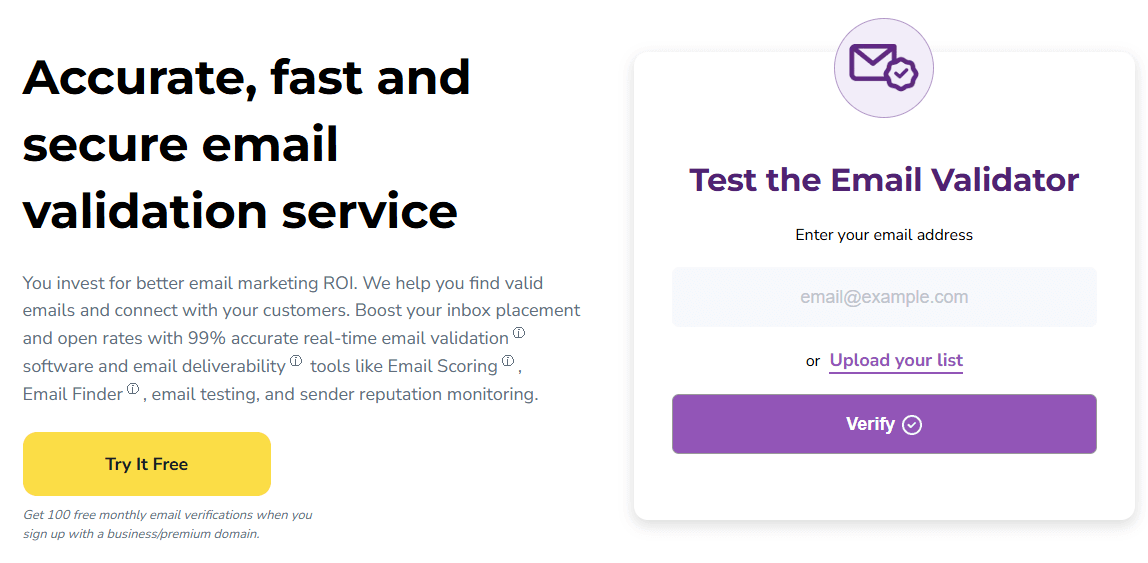
ZeroBounce is a premium email verification service designed for marketers and businesses that need exceptionally high accuracy and detailed insights into their email lists.
It’s especially popular among those who prioritize deliverability and want to understand the quality of their contacts beyond just a “valid” or “invalid” status.
ZeroBounce prides itself on a 99% deliverability guarantee, underscoring its commitment to accuracy. It also offers more than just verification, including email activity data and intelligence features that add significant value.
Key features:
- A 99% deliverability guarantee.
- AI-driven email scoring, providing a quality rating for each email address.
- Comprehensive detection of spam traps, abuse emails, and disposable email addresses.
- Appends email activity data (like last open/click) for a more complete contact profile.
- Extensive integrations with a vast array of ESPs, CRMs, and marketing automation platforms.
- Location, gender, and IP address appending (where available) for data enrichment.
Pricing: Pay‑as‑you‑go begins at $20 for 2 k credits (~$0.01/email), with larger packs available.
Monthly plans start at $18/month for 2 k credits, offering ~18% savings and credit rollover . Higher tiers go up to $2,250/month for 1 M credits. Includes a 100‑credit free trial on business/premium domains.
| Pros | Cons |
| Very high accuracy with a 99% deliverability guarantee. | Can be one of the more expensive options for very high volumes. |
| Provides advanced email intelligence and activity data. | The extensive features might have a slight learning curve for new users. |
| Robust integration ecosystem. | Some of the data enrichment features may not be relevant for all users, increasing perceived cost for basic verification. |
- NeverBounce
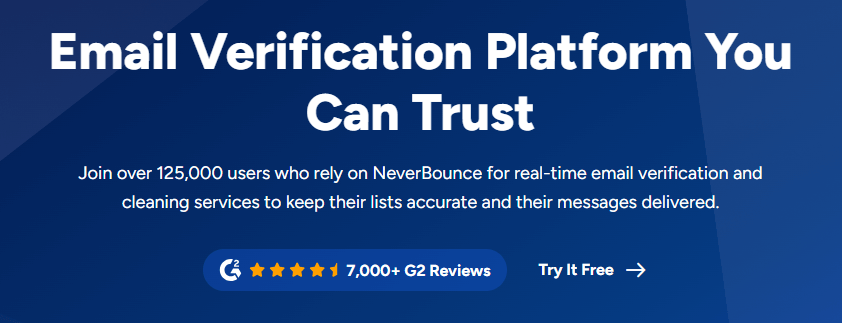
NeverBounce is an excellent choice for businesses with very large, dynamic email lists that require fast, reliable bulk verification. Its strength lies in processing massive datasets quickly and efficiently, making it ideal for enterprises or agencies that handle high volumes of email addresses.
NeverBounce is widely recognized for its speed in processing large datasets and its robust integration capabilities. Its “Clean & Sync” feature is particularly notable for automating list hygiene with your ESP.
Key features:
- Real-time verification API for instant validation at the point of capture.
- Rapid bulk list cleaning, capable of processing millions of emails swiftly.
- Categorizes emails into five distinct groups: valid, invalid, accept all, unknown, and disposable.
- Features “Clean & Sync” for automatic list synchronization with popular ESPs.
- Offers extensive integrations with over 50 platforms, including marketing automation and CRM tools.
- Provides detailed reports on verification outcomes.
Pricing: NeverBounce primarily operates on a pay-as-you-go pricing model, where credits do not expire. They also offer custom enterprise plans for extremely high volumes. Pay‑as‑you‑go pricing scales with volume:
- $0.008/email (up to 10 k)
- $0.005/email (up to 100 k)
- $0.004/email (up to 250 k)
- $0.003/email (to 1 M)
- $0.0025/email (beyond)
A low‑tier “Sync” subscription starts at $29/month for 10 k credits.
| Pros | Cons |
| Exceptional speed for bulk list verification. | Pay-as-you-go model might be less cost-effective for extremely consistent, very high daily volumes compared to some subscription models. |
| Strong emphasis on real-time API performance. | Some users might desire more granular data enrichment features beyond basic deliverability status. |
| Extensive array of integrations available. | |
| “Clean & Sync” feature automates list hygiene. |
- Kickbox

Kickbox is a reliable solution especially suited for businesses that prioritize deliverability and need strong API capabilities for real-time verification at the point of entry. It’s a favorite among developers and marketers who require a high degree of precision and integration control to maintain email list hygiene.
Kickbox has built a strong reputation for its focus on deliverability and a very reliable API. Its “Sendex™” score helps users understand the risk associated with an email address, providing a nuanced view beyond simple validation.
Key features:
- Real-time API for immediate validation of email addresses as they are submitted.
- Comprehensive checks for syntax, domain validity, and MX records.
- Identification of disposable email addresses and high-risk emails.
- Patented “Sendex™” score that predicts the deliverability of an email.
- Integrates with popular marketing automation and CRM platforms.
- Offers a “do not mail” list feature to suppress problematic addresses.
Pricing: Comes with 100 free trial credits on sign-up.
Pay‑as‑you‑go packs include (not all are listed here):
- 500 emails for $5
- 10 k for $80
- 1 M for $4,000
A basic plan ($5/month) supports both bulk and API usage. Credits are valid for 12 months, and pricing scales downward with volume.
| Pros | Cons |
| High accuracy with a strong focus on deliverability. | While accurate, some competitors offer more explicit guarantees on deliverability. |
| Strong and developer-friendly API for real-time validation. | Some users might find its dashboard less feature-rich compared to tools offering extensive data enrichment. |
| “Sendex™” score provides useful insight into email quality. |
- Clearout
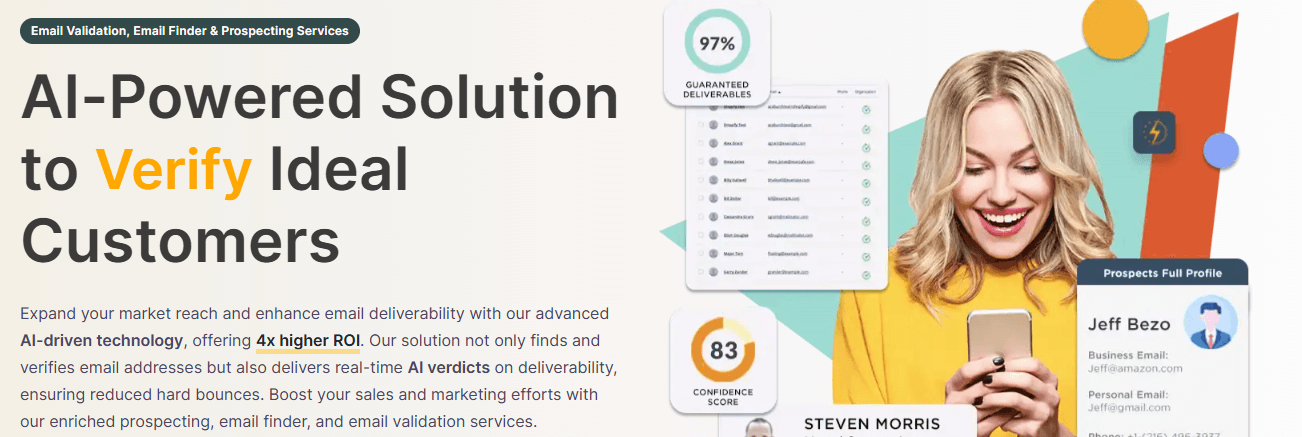
Clearout serves as a versatile solution for sales and marketing professionals who need both email verification and an email finder. It’s well-suited for lead generation efforts where finding and immediately validating contact information is crucial for outreach campaigns.
Clearout shines by combining high accuracy and speedy processing with the added utility of an integrated email finder tool. This dual functionality can streamline workflows for sales development representatives and recruiters.
Key features:
- Both single and bulk email verification options for flexibility.
- Real-time API validation for immediate feedback on email quality at entry points.
- Comprehensive detection of catch-all domains, disposable emails, and spam traps.
- Includes an Email Finder functionality to locate professional email addresses based on company domains.
- Integrates with various CRM systems and Email Service Providers.
- Offers deduplication services for email lists.
Pricing: Offers 100 free credits/month upon sign-up. Starter subscription includes 3 k credits for $14/month (annual billing) or $18/month (monthly billing); credits roll over and never expire. .One‑time credit packs are available.
| Pros | Cons |
| Combines email verification with an email finder tool. | The free tier offers a limited number of credits, requiring a paid plan for substantial use. |
| High accuracy and fast processing speeds. | Some advanced data enrichment features found in other tools might not be as prominent. |
| Flexible pricing with both subscriptions and pay-as-you-go. | User interface, while functional, might be considered less sleek than some competitors by some users. |
| Good for sales and outreach efforts. |
- Hunter (Email Verifier)
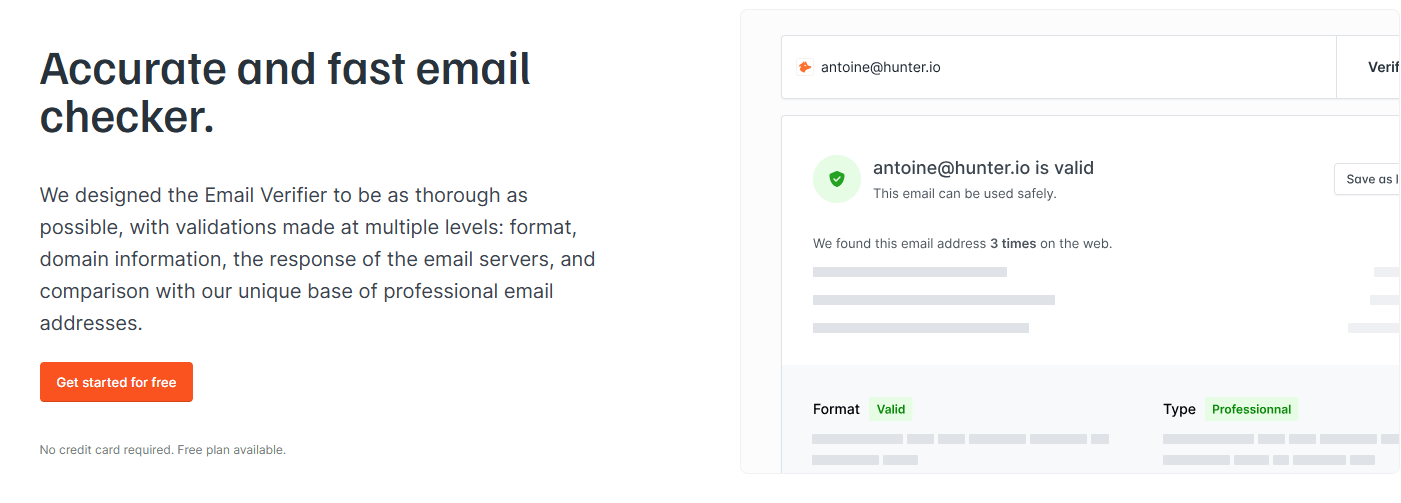
Hunter.io is primarily known for its Email Finder and Bulk Email Finder, but its Email Verifier is a strong complementary feature. It’s ideal for sales professionals, recruiters, and marketers who need to find and verify business email addresses, particularly when building outreach lists from scratch based on company domains.
Hunter’s core strength is its ability to find professional email addresses linked to specific domains, and its verifier seamlessly integrates into this workflow. It provides confidence scores for emails it finds, which is a unique benefit.
Key features:
- Verifies emails found directly through its Email Finder service.
- Checks for valid status, identifies catch-all domains, and temporary email addresses.
- Offers bulk email verification for uploaded lists.
- Provides a confidence score for each email, indicating the likelihood of deliverability.
- Includes a Chrome extension for verifying emails directly while Browse websites.
- Integrates with popular CRM and outreach platforms.
Pricing: Free plan includes 50 verifications/month + 25 searches .
Includes pay‑as‑you‑go Data Platform credits (up to 200 k or ~$6,500) valid for 12 months
| Pros | Cons |
| Excellent for finding and verifying business emails simultaneously. | Primarily focused on business emails; less emphasis on consumer email verification. |
| Provides a confidence score for each email address. | Verification is often a secondary feature to its email finding capabilities. |
| User-friendly interface and convenient Chrome extension. | The free tier is quite limited for extensive usage. |
| Good for sales and outreach use cases. |
- Bouncer
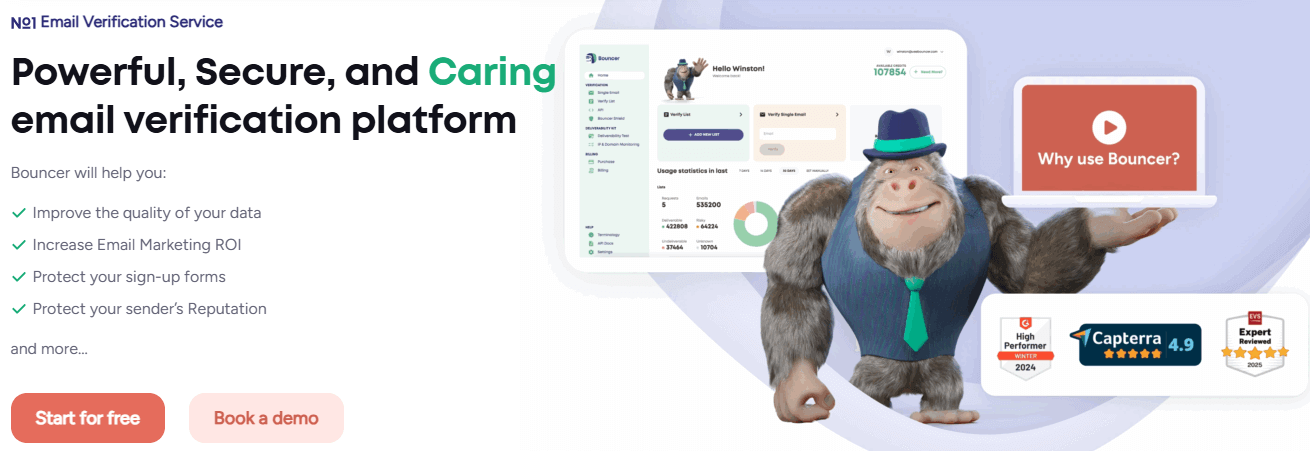
Bouncer is an excellent choice for businesses of all sizes looking for an accurate, user-friendly, and GDPR-compliant email verification service. It’s particularly appealing to those who value data security and a clean, reliable email list without compromising privacy.
Bouncer is known for its ease of use, security measures, and deliverability-focused features, including a unique “Toxicity Check.” Its commitment to GDPR compliance also gives it an edge for European businesses or those dealing with European data.
Key features:
- High accuracy in identifying valid, invalid, and risky email addresses.
- Both real-time API and bulk email verification options for various needs.
- Toxicity Check identifies potentially harmful or problematic email addresses like those associated with spam traps, abuse, or blacklists.
- Deliverability Kit includes features like email health and inbox placement tests to optimize campaign performance.
- Strict GDPR compliant, ensuring data privacy and security.
- User-friendly interface designed for straightforward navigation and reporting.
- Offers integrations with various marketing platforms.
Pricing: Pay‑as‑you‑go from $8 for 1 k credits (~$0.008/email), falling to $2/1 k at 1 M credits .
Subscription plans include:
- Apprentice – $50/month
- Adept – $200/month
- Master – $1,000/month
All tiers include “Toxicity Check” and deliverability tools.
| Pros | Cons |
| High accuracy and strong focus on deliverability. | The deliverability kit, while valuable, may be an additional learning curve for some users. |
| User-friendly interface makes it easy to get started. | Some users might prefer even more direct ESP integrations than currently offered, depending on their specific stack. |
| Unique “Toxicity Check” identifies risky emails. | Pricing for very large enterprise volumes might require custom quotes. |
Choosing the right email verification service for your needs
With several powerful email verification tools available, deciding which one is best for your business requires a thoughtful approach. The “right” tool isn’t a one-size-fits-all solution; it depends on your specific operational needs, list volume, and budget. Here’s how to assess your options and make an informed decision.
To get a peek at how EmailListVerify stacks up against some of the great tools on this list, check out our comparison page.
Assess your current list size and verification frequency
Start by evaluating the scale of your email marketing efforts.
- Existing list volume: Do you have a large, established email list (tens of thousands, hundreds of thousands, or even millions) that needs a one-time or periodic deep clean? Tools strong in bulk verification will be a priority.
- New lead acquisition: How many new email addresses do you collect daily or monthly through sign-up forms, lead magnets, or sales activities? If it’s a constant stream, a tool with a robust real-time API for immediate validation at the point of entry is essential to prevent bad data from accumulating.
- Frequency of cleaning: Will you be verifying lists monthly, quarterly, or on a continuous basis? This impacts whether a pay-as-you-go model or a subscription plan makes more financial sense.
Evaluate your integration requirements
Your existing tech stack plays a big role in your choice. A tool that smoothly integrates with your current platforms will save you significant time and effort.
- Email Service Providers (ESPs): Identify which ESPs and email automation tools you use and look for direct integrations that allow for easy list import, export, and synchronization after verification.
- CRM Systems: If you manage contacts in a CRM like Salesforce or Zoho CRM, check for integrations that help maintain clean data across your sales and marketing databases.
- Custom Workflows: Do you have unique data flows or proprietary software that needs to interact with the verification service? In this case, API accessibility and comprehensive documentation are paramount for your development team.
Compare accuracy and features
Never compromise on the accuracy of the verification service. Even the most feature-rich tool is ineffective if its results are unreliable.
- Verification precision: Look for tools that offer high accuracy rates, ideally with a deliverability guarantee. This confirms their ability to correctly identify valid and invalid emails.
- Detection capabilities: Prioritize features that address your specific pain points. If disposable emails are a common issue for your sign-ups, ensure the tool has strong DEA detection. If spam traps are a concern, confirm its ability to identify and remove them.
- Additional Intelligence: Consider if you need more than just a “valid/invalid” status. Some tools offer insights like email activity data, toxicity checks, or deliverability scoring (like Kickbox’s Sendex™ or ZeroBounce’s AI scoring), which can add significant value to your segmentation and outreach.
Consider pricing and budget
Email verification costs can vary widely. It’s important to understand the different pricing models and how they align with your budget and usage patterns.
- Pay-as-you-go vs. subscription: Decide whether purchasing credits as needed (good for unpredictable or infrequent use) or a recurring monthly/annual plan (better for consistent, high-volume needs) is more economical for your business.
- Cost per verification: Compare the cost per email verification across different tiers and providers. Sometimes, a higher upfront cost for a larger credit package can result in a lower per-email price.
- Transparency: Look for transparent pricing with no hidden fees. Many providers offer a free trial or a number of free credits, which is an excellent way to test the service without commitment.
Carefully evaluating these factors goes a long way in helping you select an email verification tool that not only meets your immediate needs, but also supports your long-term email marketing goals.
Conclusion: Invest in a clean email list, invest in your success
As we navigate 2025, it’s clear that a clean email list is not just a nice-to-have; it’s the bedrock of successful email marketing. It’s the essential starting point for every campaign, every outreach effort, and every customer interaction delivered via email.
By proactively verifying your email addresses, you’re doing more than just tidying up your database – you’re actively boosting your email deliverability, protecting your critical sender reputation, and ultimately, saving marketing budget that would otherwise be wasted on invalid contacts. This commitment to data hygiene translates directly into higher open rates, better engagement, and a stronger ROI from your email campaigns.
Don’t let a dirty email list hold your business back! Embrace the power of email verification and see how a pristine list can transform your marketing results.
Ready to transform your email marketing results? Clean your email list today with EmailListVerify and experience higher deliverability and improved ROI.
Join Our Monthly Newsletter
Learn how to improve email deliverability and clean your email lists with and more.


